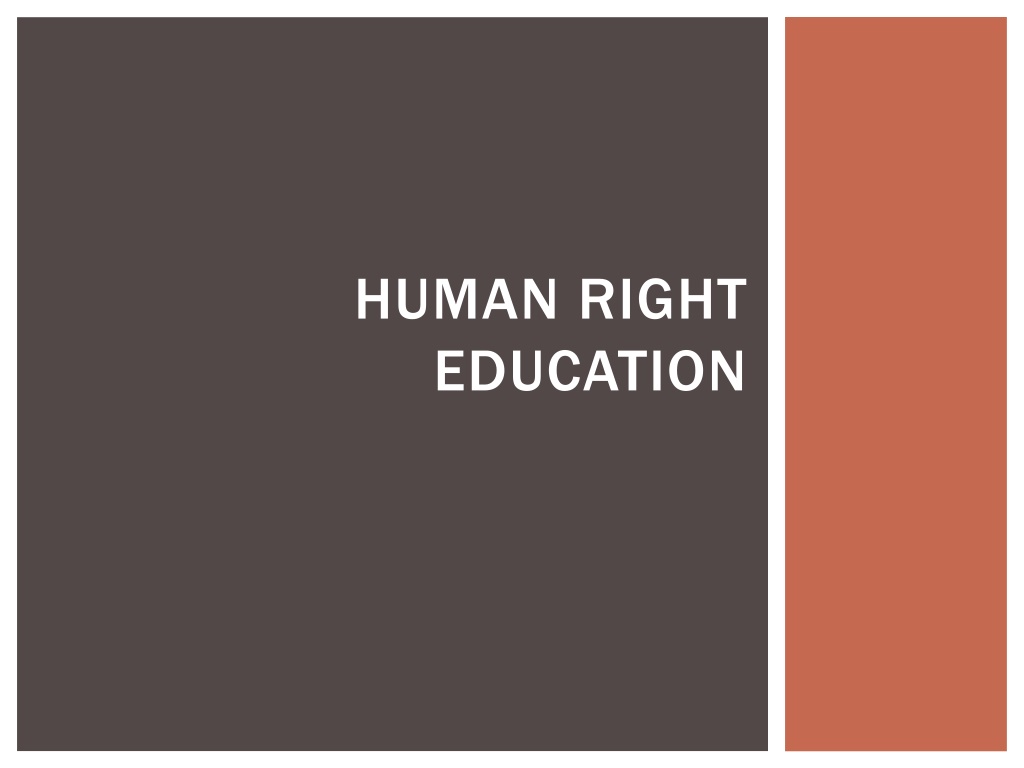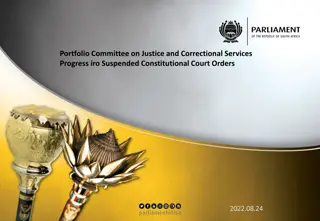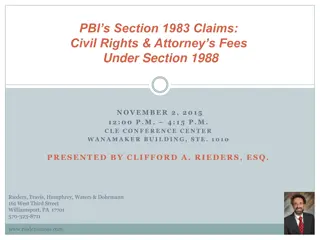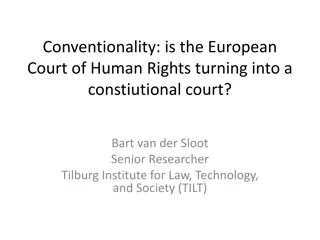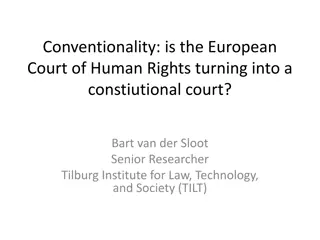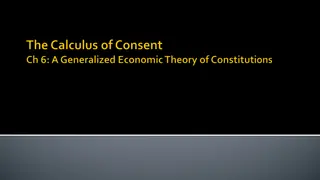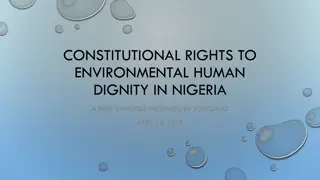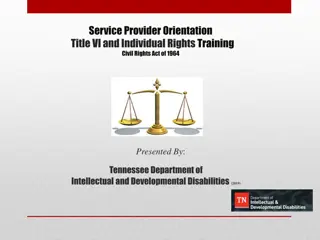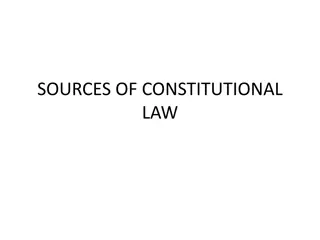Understanding Human Rights and Constitutional Rights
Human rights are essential entitlements every individual should enjoy without fear, ensuring a dignified life. Constitutional rights further protect personal liberties, fair hearings, and privacy, forming the basis of a just society. Discover the significance and nuances of these fundamental rights in this comprehensive overview.
Uploaded on Nov 22, 2024 | 0 Views
Download Presentation

Please find below an Image/Link to download the presentation.
The content on the website is provided AS IS for your information and personal use only. It may not be sold, licensed, or shared on other websites without obtaining consent from the author. Download presentation by click this link. If you encounter any issues during the download, it is possible that the publisher has removed the file from their server.
E N D
Presentation Transcript
HUMAN RIGHT EDUCATION
INTRODUCTION WHAT IS HUMAN RIGHTS Human Rights has been defined as the inalienable rights of people . They are the legal entitlements which every citizen should enjoy without fear of the government or other fellow citizens. They are said to be the rights which cannot be said to have been given to man by man but are earned by man for being a human because they are necessary for his continuous happy existence with himself, his fellow man and for participation in a complex society
INTRODUCTION Though many fundamental rights are also widely considered human rights, the classification of a right as "fundamental" invokes specific legal tests courts use to determine the constrained conditions under which the United States government and various state governments may limit these rights. In such legal contexts, courts determine whether rights are fundamental by examining the historical foundations of those rights and by determining whether their protection is part of a longstanding tradition.
INTRODUCTION Individual states may guarantee other rights as fundamental. That is, States may add to fundamental rights but can never diminish or infringe upon fundamental rights by legislative processes. Any such attempt, if challenged, may involve a "strict scrutiny" review in court. Everyone has at a point or the other hand the word HUMAN RIGHT . In the fact that firstly as a human and as citizens of a particular country, there are certain things you automatically entitled to and they are called human right.
CONSTITUTIONAL RIGHTS Right to life - Section 33 (1999 constitution) every person has a right to life, and no one shall be deprived intentionally of his life, save in execution of a criminal offence of which he has been found guilty in Nigeria. right to dignity of human person - Section 34 (1999 Constitution) Every individual is entitled to respect for the dignity of person and accordingly no person shall be subject to torture or to inhuman or degrading treatment.
CONSTITUTIONAL RIGHTS Right to personal liberty - Section 35 (1999 constitution) every person shall be entitled to his personal liberty and no person shall be deprived of such liberty. Right to fair hearing - Section 36 (1999 constitution) in the determination of a person's civil rights and obligations, every person shall be entitled to fair hearing. Right to private and family life - Section 37 (1999 constitution) the privacy of citizens, their homes, correspondences and telephone conversations is guaranteed and protected.
CONSTITUTIONAL RIGHTS Right to freedom of thought, conscience and religion - Section 38(1999 constitution) every person shall be entitle to freedom of thought, conscience and religion, including freedom to change his religion or belief. Right to freedom of expression and the press- Section 39 (1999 constitution) every person shall be entitled to freedom of expression, including freedom to hold opinions. Right to peaceful assembly and association - Section 40 (1999 constitution) every person shall be entitled to assemble freely and associate with other persons or political party.
CONSTITUTIONAL RIGHTS Right to freedom of movement - Section 41 (1999 constitution) every citizen in Nigeria is entitled to move freely throughout Nigeria and to reside in any part thereof. Right to acquire and own immovable property anywhere in Nigeria - Section 43 (1999 constitution) Every Citizen shall have right to own immovable property anywhere in Nigeria. Right against compulsory acquisition of property - section 44 (1999 constitution) the above are fundamental human rights enshrined in the 1999 constitution and accorded to all Nigerians.
FUNDAMENTAL PRINCIPLES/ FEATURES OF HUMAN RIGHT. 1.EQUALITY: Human rights belong to an individual because of his very existence. They are inherited by all individuals irrespective of their cast, religion, sex and nationality. 2.ESSENTIAL AND NECESSARY These rights are essential for all individuals. In their absence, physical, moral, social and spiritual welfare is impossible. They are also necessary because they provide suitable conditions for moral upliftment of the people
FUNDAMENTAL PRINCIPLES/ FEATURES OF HUMAN RIGHT. 3.CONNECTION WITH HUMAN DIGNITY The idea of human rights is bound with the idea of human dignity. Thus all those rights which are essential for the maintenance of human dignity may be called human rights. 4.IRREVOCABLE: Human rights are irrevocable. They cannot be taken away by any power or authority. They belong to a person simply because he is a human being.
FUNDAMENTAL PRINCIPLES/ FEATURES OF HUMAN RIGHT. 5.NECESSARY FOR FULFILLMENT OF PURPOSE OF LIFE: Human life has a purpose. The term Human rights is applied to those conditions which are essential for the fulfillment of this purpose since rights are bound with the purpose of human life. No government has the power to curtail or take away these rights. 6.UNIVERSAL: Human Rights belong to each and every one of us. The values which form the basis of those rights are inherent in human nature.
7.DYNAMICS: They are dynamic in nature. As societies change, rights also under go changes. Judges have to interpret laws in such ways that they are in tune with the changed social values. 8.RIGHTS HAVE LIMITS TO THE STATES POWER Human rights imply that every individual has legitimate claims upon his or her society for certain freedoms and benefits. So Human Rights limit the state s power. For example, 6 freedoms that are given under the Rights to Liberty forbid the state from interfering with the individual.
HUMAN RIGHTS EDUCATION Is the teaching of the history, theory, and law of human rights in schools and educational institutions, as well as outreach to the general public. The emphasis on Human Rights Education began in 1995 with the beginning of the UN Decade for Human Rights Education, though previously addressed in 1953 with the UNESCO Associated Schools Program, which served as an initial attempt to teach human rights in formal school settings .
The first formal request for the need to educate students about human rights came about in UNESCO s 1974 article Recommendation concerning Education for International Understanding, Cooperation and Peace, and Education Relating to Human Rights and Fundamental Freedoms. The participants of the International Congress on the Teaching of Humans Rights eventually met in 1978 to form a specific definition of what would be required application of the education in formal curricula.
The aims at which the Congress agreed upon including the encouragement of tolerant attitudes with focus on respect, providing knowledge of human rights in the context of national and international dimensions as well as their implementations, and finally developing awareness of human rights translating into reality whether social or political on national and international levels.
CONCLUSION Human right education is directed to the full development of the human personality and to the strengthening of respect for human rights and fundamental freedoms. It promotes understanding, tolerance and friendship among all nations, racial or religious groups, and it promotes the activities of the United Nations for the maintenance of peace.
CONCLUSION Therefore states should eradicate illiteracy and should direct education toward the full development of the human personality and to strengthen of respect for human rights and fundamental freedoms. Human rights education should include peace, democracy, development and social justice, as set forth in international and regional human rights instruments, in order to achieve common understanding and awareness with a view to strengthening universal commitment to human rights.
